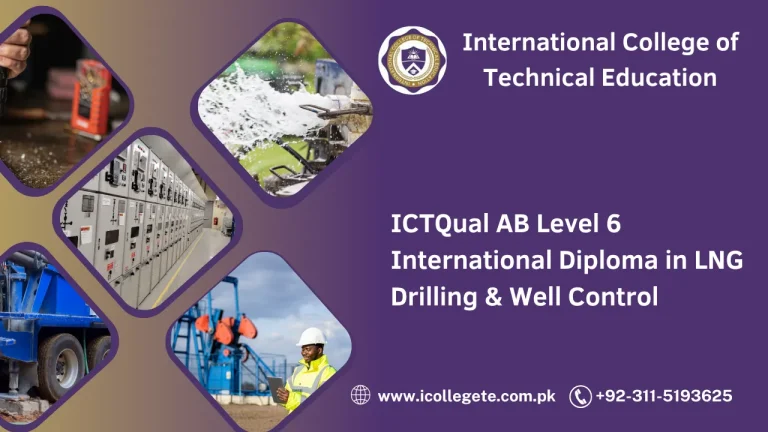Civil engineering is a cornerstone of modern society, responsible for designing, constructing, and maintaining the infrastructure that supports our daily lives—roads, bridges, buildings, and water systems. As the demand for sustainable, safe, and efficient infrastructure continues to rise globally, the need for skilled civil engineers has never been greater. The ICTQual Level 5 Diploma in Civil Engineering (240 Credits) is a two-year program that provides students with the advanced skills and in-depth knowledge necessary to succeed in the civil engineering industry.
The ICTQual Level 5 Diploma in Civil Engineering (240 Credits) is a comprehensive two-year qualification aimed at developing a deep understanding of civil engineering principles and their practical applications in the real world. This program is designed for individuals who wish to build a strong foundation in civil engineering and pursue a successful career in infrastructure development, project management, or construction.
Students will be equipped with the knowledge needed to design, plan, and manage civil engineering projects, with a focus on sustainable, cost-effective, and safe solutions. The course combines theoretical learning with practical experience, ensuring graduates are well-prepared to tackle the challenges facing the civil engineering industry today.
Course Overview
The ICTQual Level 5 Diploma in Civil Engineering is structured to cover a broad spectrum of civil engineering topics, from structural analysis and geotechnical engineering to transportation systems and water resource management. Over two years, students will explore both the technical and managerial aspects of civil engineering.
The curriculum is designed to provide students with both the core principles and specialized knowledge needed to thrive in civil engineering roles. Through a combination of classroom instruction, hands-on projects, and real-world case studies, students will gain a comprehensive understanding of the civil engineering profession.
Learning Outcomes
Upon successful completion of the ICTQual Level 5 Diploma in Civil Engineering (240 Credits), students will be able to:
- Apply Core Civil Engineering Principles: Demonstrate proficiency in fundamental civil engineering concepts, such as materials science, structural analysis, and fluid mechanics.
- Design Civil Engineering Solutions: Develop designs for civil engineering projects, including roads, bridges, buildings, and drainage systems, ensuring they are safe, sustainable, and cost-effective.
- Conduct Site Assessments: Evaluate and analyze site conditions, including soil properties, topography, and environmental impact, to inform engineering designs.
- Use Advanced Engineering Tools: Utilize industry-standard software and simulation tools to model, analyze, and optimize civil engineering designs and processes.
- Implement Sustainable Practices: Integrate sustainability principles into civil engineering projects, focusing on environmental impact, resource management, and energy efficiency.
- Manage Projects Effectively: Apply project management techniques to plan, execute, and oversee civil engineering projects, ensuring they are completed on time and within budget.
- Ensure Health and Safety Standards: Demonstrate knowledge of construction safety standards and risk management strategies to ensure the safety of workers and the public during civil engineering projects.
- Work in Multidisciplinary Teams: Collaborate with other professionals such as architects, urban planners, and environmental engineers to successfully deliver civil engineering projects.
Study Units
The ICTQual Level 5 Diploma in Civil Engineering includes a wide range of study units designed to give students a well-rounded understanding of the civil engineering field. Some of the core units in this course include:
- Year 1:
- Engineering Principles and Applications
- Mathematics for Civil Engineers
- Structural Mechanics
- Materials Science and Technology
- Geotechnical Engineering
- Hydraulics and Fluid Mechanics
- Surveying and Measurement Techniques
- Engineering Drawing and CAD
- Construction Technology
- Project Management for Engineers
- Advanced Structural Analysis
- Environmental Engineering
- Year 2:
- Transportation Engineering
- Construction Management and Law
- Water Resources Engineering
- Building Information Modeling (BIM)
- Advanced Geotechnical Engineering
- Structural Design in Concrete and Steel
- Risk Management in Civil Engineering Projects
- Sustainable Construction Practices
- Advanced Hydraulics and Fluid Flow
- Urban Infrastructure and Development
- Smart Cities and Technology in Civil Engineering
- Capstone Project and Dissertation
Course Benefits
- Comprehensive Knowledge: The course provides a deep understanding of both the theoretical and practical aspects of civil engineering, ensuring that graduates are well-prepared for industry challenges.
- Hands-On Experience: Through real-world case studies, projects, and site visits, students gain valuable experience that can be directly applied to their careers.
- Focus on Sustainability: The course emphasizes the importance of sustainability in civil engineering, equipping students with the skills to design and implement environmentally friendly infrastructure projects.
- Industry-Relevant Skills: Students are trained in the latest industry tools and technologies, including Building Information Modelling (BIM) and advanced project management techniques, which are essential for success in the modern civil engineering landscape.
- High Employability: With a growing demand for skilled civil engineers globally, this qualification ensures graduates are highly employable, with opportunities in construction, project management, infrastructure development, and more.
- Pathways to Further Education: Upon completing the diploma, students can continue their studies with a degree in civil engineering or related fields, opening doors to advanced career opportunities and professional development.
- Global Career Opportunities: Civil engineering is a globally recognized field, and graduates of this program will have opportunities to work in both local and international projects across various sectors.
Who is This Course For?
The ICTQual Level 5 Diploma in Civil Engineering (240 Credits) is ideal for individuals who are passionate about infrastructure development and want to pursue a rewarding career in civil engineering. This course is suited for:
- Aspiring Civil Engineers: Individuals who want to gain the skills and knowledge needed to become professional civil engineers and contribute to designing and building essential infrastructure.
- Engineering Graduates: Those with a background in mechanical, electrical, or environmental engineering who wish to specialize in civil engineering.
- Construction Industry Professionals: Individuals working in construction, project management, or site supervision who want to formalize their qualifications and advance their careers.
- Career Changers: People with a background in other technical or scientific fields who wish to transition into civil engineering.
- High School Graduates: Individuals who have completed secondary education and are looking to pursue a structured path into civil engineering, providing them with a comprehensive understanding of the field.
The ICTQual Level 5 Diploma in Civil Engineering (240 Credits) offers an in-depth and well-rounded education in civil engineering, equipping students with the knowledge and practical skills needed to succeed in this dynamic and rewarding field. With a strong emphasis on sustainability, project management, and hands-on learning, this course prepares graduates for a variety of career paths in infrastructure development, construction, and project management. Whether you’re aspiring to become a civil engineer or enhance your skills in the industry, this diploma provides the perfect foundation for a successful and impactful career in civil engineering.







